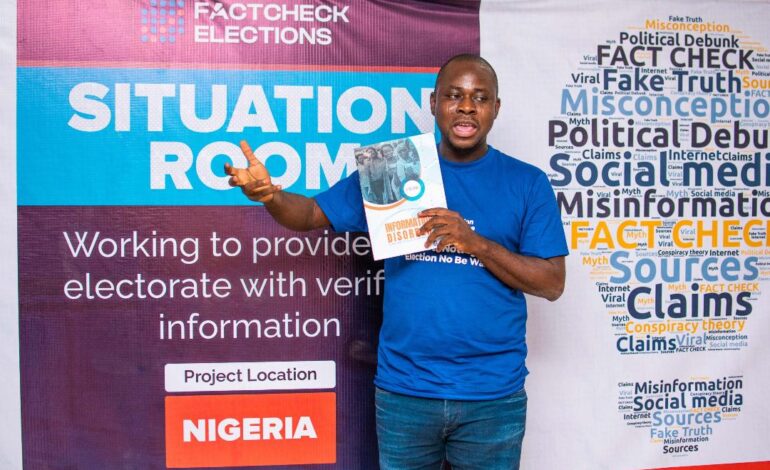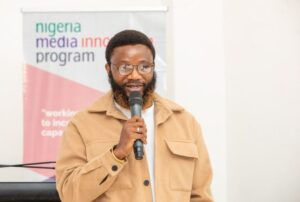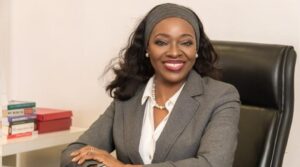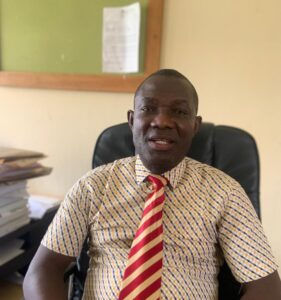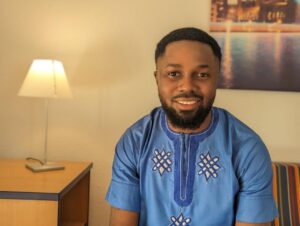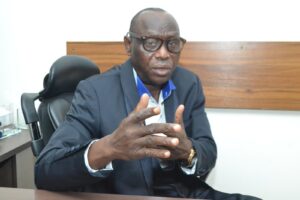Founder of FactCheck Elections, a fact-checking platform focused mainly on fact-checking information concerning elections in Nigeria, Olasupo Abideeen in this interview with Noah Aderoju, spoke about his work during the 2023 general election and lessons to be learnt from it.
As a key role player in the recent elections, especially in the information space, how would you describe these just concluded elections?
I will describe it as an election marred with a lot of misinformation and disinformation. Political parties, influencers, young persons and adults, all took solace in spreading misinformation and disinformation that suits their sentiments. So, it is an election marred with a lot of irregularities aside from violence during elections and the challenge of logistics from the Independent National Election Commission (INEC).
In short, from two weeks before the election till three days after the elections, our team was extremely busy fact-checking fake news and despite the fact check, people still continued to share it. A major one that people continue to share on the day of the election was that you can vote without a Permanent Voters Card (PVC).
Being in the business of sieving truth and falsehood out of the tonnes of publicly available information, what would you say about the Nigeria Information sharing ecosystem?
The Nigerian information-sharing ecosystem is not well regulated. The government has not been making those who share fake news serve as deterrents to others, thanks to members of the political party of the government of the day as well, especially information dissemination on WhatsApp, Facebook and even Twitter as well. It is something that is worrisome and calls for concern because fake news is another pandemic that if we do not nip it in the bud can cause this country to get burnt one day. It’s so sad that our information-sharing ecosystem makes a lot of people gullible because a lot of people do not even fact-check before they continue to share.
In the recent elections, it was clear that aside from voter intimidation, election violence, online misinformation and disinformation are some of the things that marred the election. Apart from politicians who were the drivers of the information disorder about Nigerian politics?
Yes, politicians are not only the drivers of misinformation. Supporters of politicians, political parties and influencers as well across different social media are also drivers of information disorder about Nigerian politics.
How has the Nigerian media faired in the business of disproving falsehoods?
I do not have concrete data to rank the Nigerian media, so for few ones who are in the business of disproving falsehoods like TheCable Newspaper and Premium Times Newspaper are doing their best. I don’t have concrete data to say that I can rank the Nigerian media 75%, 60% or 40%. I will require an in-depth analysis or research of each media organisation. What is their focus and what have they been doing in terms of disproving falsehoods? So that will be a product of in-depth research and I don’t have data to back that up so I can comment on that.
What led you to establish Factcheck Elections?
We started Factcheck Elections because we discovered a lot of fact-checking platforms are doing all other things but there is no major one that is focused only on elections to help people. That was why we started FactCheck Elections. The organization is run by a management team and a team of volunteers that cuts across the 36 states of the federation who have been trained both online and physically by us.
READ ALSO: ‘Fact-check to avoid misinformation, errors’
Does being an election-focused fact-checking outfit mean after elections you will be out of business?
We are not going to be out of business after the elections. Election is not a day, it is a period. Pre-election is part of the election, post-election is part of the election, and the tribunal cases will be going on across different platforms which also relate to elections. Cases will be going to the appeal court, cases to the Supreme Court so it also relates to election and governance as well. Though post-election we might be tilting towards governance a little bit, of course, we are still much focused on election as cases are in court and we still need to fact-check.
What is your view on collaborative media projects like the Nigeria FactCheckers Coalition?
A collaborative media project is good. Though we have applied to the Nigerian FactCheckers Coalition they have not gotten back to us even after also reaching out unofficially to one of the main team members. The coalition is okay. Of course, we are an advocate of collaboration and not competition. When we collaborate I think our voices will be more heard and the things we push out will be more recognised.
What have you learnt from fact-checking Nigeria elections?
I have been able to learn from fact-checking Nigerian elections that we have young people in Nigeria who are passionate about this country and who want to contribute to its growth and entrench a democratic dividend because the majority of our volunteers are only paid stipends which is not commensurate with the expertise they are bringing on board to the organization. I have also learnt that a lot of Nigerians like to spread misinformation, even when you tell them they are still adamant about it. I think that is a product of illiteracy and ignorance. I have also learnt that a lot of influencers take solace in spreading misinformation and disinformation.
Factchecked reports don’t always reach as many people as faulty claims, and only a few of those who get the initial faulty information get to see the debunks. What is being done about this?
Unfortunately, we are confronted with a paucity of funds so it is practically impossible to ensure that our fact-checks reach millions the way we would have expected. Part of what we are working on is collaborating with radio stations to see how some of our fact checks will be part of their news. But for now, we are still constrained by finance. If we are not constrained by finance what we will be doing is making sure all our fact-checks will be broadcast on Radio, Television and we will do sponsored adverts as well so that we will reach a larger percentage of the people.
Many hard decisions made as a result of faulty information consumed are made offline as many Nigerians who are susceptible to believing these falsehoods are offline and may never get to see or hear fact-checked reports which are predominantly available only online. What are you doing to bring credible information and debunks to people like the street vendors who believe that bank transactions were blocked during elections because of some political candidates, the illiterate Lagos landlord who believed the Igbos are planning to take over his land and others?
As I said earlier, unfortunately, we are restricted with the little fund that we have and that is why we are open to partnerships for people to collaborate with us, fund or support us as well. So the only thing we can do is when we get the funding we will intensify our efforts and ensure that fact-checks are being translated into local languages for people in the local communities to be able to understand but for now we are not able to do that yet.
In your personal post-election analysis, what lesson do you want Nigerians to hold dear to their heart going forward?
The lesson I want Nigerian to hold dearly is that no election is worth their life. Politicians will always do what pays them in terms of their own personal sentiments. We have seen a lot of politicians cross-carpeting. We have even seen a person who was the candidate of a political party in the House of Representatives decamp barely three days after losing the election. That really shows that politicians don’t care about you but only their personal sentiments.
And of course issues around spreading fake news would only be reduced if every one of us are committed to reducing it. Before sharing content online you should try to sit down yourself and fact-check it. It doesn’t cost a fortune. Reach out to people who fact-check, and share that information with them to help you fact-check (If you can’t fact-check). And also, Nigerians should fact-check the fact-checkers as well. So for me, my personal lesson is that no election is worth a life and Nigerians should always confirm and verify the information before they continue to share widely.
